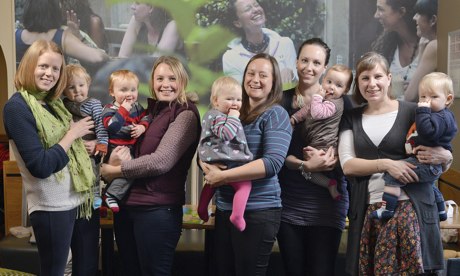
In a Costa Coffee in Channon retail park, near Eastleigh, Hampshire, sit five of the best adverts for new(ish) motherhood (their babies are all a year old) that modern life has.
Carrie, 33, with Jack, said: "If you named one thing that kept us going, it would be each other." They have the ancient solace of friendship with the modern handiness of Facebook, the cherry-picked best of every century.
None of them had post-natal depression. They met through NCT, but all that stuff you hear about NCT – instructors who don't believe in pharmacology, competitive birth plans – is the opposite of their experience, where the teacher was warm and open-minded, lifelong friendships were made, and they role-played a caesarean, using the husbands.
So maybe their birth plans didn't pan out – "Nothing went the way I'd wanted it, except for the fact that I ended up with a baby," Sarah, 30, said wryly of her daughter, Aoife – but on balance, Carrie concluded: "We all went to Winchester [hospital], and we all said, as much as our plans didn't go to plan, it was brilliant."
In short, these are not moaners. What they say about breastfeeding should not, under any circumstances, be written off as the kind of thing people say who like to moan.
Of six mothers in the group (one couldn't make the interview), two bottle-fed. Katy, 31, with Ethan, is plagued by it. "I couldn't feed because my milk didn't come in. I know that we did the right thing for him, because he would have been readmitted [to hospital]. But even now, a year on, I'm thinking, maybe he had a tongue tie. Maybe I should have tried that. I keep thinking of a million things I could have done differently."
Carrie recalled: "I had a really good health visitor and she said: 'Just do what makes you happy. In the end, this is a really short time and you've got to enjoy it.' I took that piece of advice, and I did just really enjoy him. But the next health visitor who came round, I personally felt a little embarrassed to tell her the decision I'd made."
Everyone else breastfed; some found it a lot easier than others. Karen, 31, with Stanley, said: "We did ask about a tongue tie in the antenatal classes, and they said it was very rare. In the end, four out of the six babies had one."
One of them was Sarah's daughter: "I remember my nipples nearly fell off. I was going to every boob drop-in in the world, I was cracking them out everywhere I went. You get told: 'If it hurts, you're not doing it right.' When you said it hurt, people told you it didn't hurt.
"The baby doesn't latch on properly so you get mastitis. Because you've got that, you're on antibiotics, so then you get thrush. I didn't realise it was going to be so hard."
Tom, Niamh's father and Emma's partner, said mildly: "They completely skirt over bottle feeding. When you're going through tough times, they always say 'stick with it'. They never say 'maybe this is a bit too tough.'"
Katy puts this a little more strongly. "Their answer to everything is feed more. If something goes wrong, feed more. If you get mastitis, feed more. If you've got no milk, feed more."
I have a view on this (of course I do), which is that, in order for breastfeeding to have the no-alternative, liquid-gold status it enjoys in public health, its benefits would have to be so much more pronounced and demonstrable that you wouldn't even need to demonstrate them.
Furthermore, breastfeeding activists (or lactivists) shouldn't have to borrow risk factors from the developing world to make mothers in Eastleigh feel breast milk is the only safe foodstuff for their children.
But I didn't say that to these mothers. And maybe, for the public health effect the establishment is after, the inflexible approach is the right one, since it definitely keeps mothers plugging away.
"Because I found it so hard," said Sarah, "I think part of the reason I kept going was because of what other people thought. I'm in no way critical of women who choose to bottle feed, but I didn't want people to think I didn't want to, and I didn't want people to think that I didn't care."
Emma agreed: "Even now, when people say, 'so you've gone back to work?' I say, 'Yes, but I still breastfeed.' It's really odd, but you want people to know you've done the right thing."
And of course, not all the pressure comes from NHS leaflets and books about infant feeding. Katy remembered: "I wouldn't let anyone but my husband bottle feed because I felt that I was supposed to do it. Maybe it's partly primeval."
And it's not all pressure, Karen added. "On the other side of the coin, when you do breastfeed, they are so encouraging, you get a real boost from it." She remembered another bonus: "It meant that you could ward off other family members. It was breastfeeding, and nobody could do it apart from me."
I think one day, maybe decades from now, we'll look back on this issue baffled by the heat it generated. A lot of babies will be born in the intervening time, but their parents will continue to revel in them. And nobody's nipples, realistically, are going to fall off.

